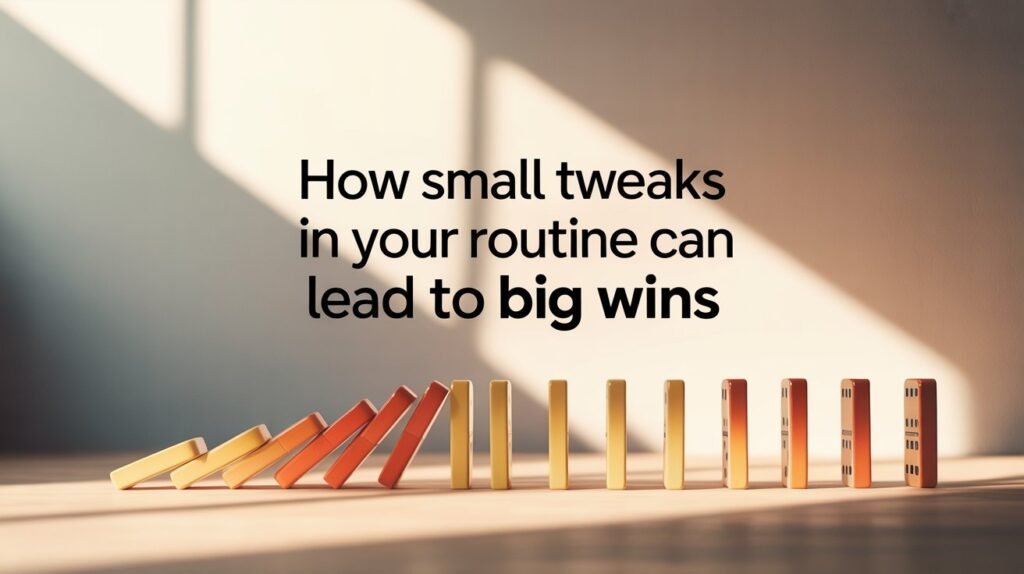Most people think success comes from big, dramatic changes. But in reality, it’s the small shifts the simple tweaks in our everyday routines that often create the most lasting impact. Whether you’re trying to be more productive, improve your wellness, or just bring more structure to your day, little changes can go a long way.
Why Small Changes Matter
Big goals are exciting, but they can also feel overwhelming. That’s why many people start strong and then lose momentum quickly. Small changes, on the other hand, are easier to commit to. They feel manageable and don’t require you to completely reinvent your lifestyle. Over time, these little improvements stack up and create big results.
When you make small adjustments that align with your existing habits, you reduce friction. You’re not forcing yourself into something new and uncomfortable; you’re refining what you already do. This makes it more likely that the habit will stick and that you’ll see results sooner than expected.
The Role of Technology in Habit Tweaks
In today’s world, technology plays a huge role in how we optimize our lives. From calendar reminders to focus apps, digital tools can help us build better habits without adding pressure. One particularly useful area of improvement is content creation. Many creators, educators, and marketers are now turning to text to AI voice solutions to streamline their workflow. Instead of recording their own voiceovers, which takes time and editing, they can now generate professional-quality audio in minutes.
This kind of small tweak doesn’t just save time it also reduces stress. You’re getting the same (or better) results with far less effort. And that’s the magic of optimization. You don’t necessarily need to work harder; sometimes, you just need better tools.
Build Momentum with Micro-Habits
Micro-habits are tiny actions that are easy to start and sustain. Think of reading two pages a night, doing five pushups in the morning, or taking a one-minute break every hour. Alone, they might seem insignificant. But over time, they snowball into consistent routines that support your larger goals.
What’s powerful about micro-habits is that they build momentum. Once you start, it becomes easier to do more. That quick stretch might turn into a 10-minute workout. Reading two pages might lead to finishing a book in a week. The key is starting small enough that it’s impossible to fail.
Habit Stacking: Pair New Habits with Old Ones
A great way to introduce new routines is by connecting them to habits you already have. This method, called habit stacking, is simple but effective. For example, if you already make coffee every morning, use that time to review your to-do list. If you brush your teeth at night, follow it with a two-minute meditation. Pairing actions together makes the new habit feel natural and easier to remember.
This structure also helps with consistency. You’re not creating new time blocks in your schedule; you’re making better use of the ones that already exist. It’s a small mental shift, but one that can lead to stronger habits with less resistance.
Systems Over Goals
Setting goals is important, but relying solely on them can be risky. Goals focus on the outcome, while systems focus on the process. Systems are what you do daily to make progress. And when you tweak your systems making them easier, faster, or more rewarding you increase your chances of long-term success.
Instead of aiming to “write a book,” for example, create a system of writing 300 words every morning. Instead of saying you’ll “get fit,” commit to doing a short workout after lunch each day. These system tweaks shift your focus from achievement to action, which is much more sustainable.
Make Use of Idle Time
One often-overlooked area of improvement is idle time. We all have small pockets of time during the day waiting in line, commuting, or winding down. These moments can be easily optimized with small tweaks. Listen to a podcast during your walk. Review your goals while waiting for food. Use a voice memo to brainstorm content ideas on your drive home.
These tiny time shifts allow you to get more done without adding pressure. They’re easy wins that add up fast, especially when repeated daily.
The Psychology of Small Wins
Every time you complete a small task, your brain gets a little reward. These positive reinforcements build confidence and motivation. They tell your brain, “I’m making progress,” which fuels further action.
By designing your day around these small wins, you give yourself more chances to feel accomplished. And that emotional boost often leads to greater consistency and focus. The more positive reinforcement you get, the easier it becomes to maintain momentum.
Rethinking “Progress”
Sometimes we overlook the small steps because they don’t feel like progress. But real growth often happens quietly. It’s not just the big breakthroughs that count; it’s the steady, consistent effort behind the scenes.
Instead of judging progress by dramatic results, try measuring it by consistency. Did you follow your routine today? Did you make one small improvement? These are signs of growth, even if they don’t seem flashy. And they’re exactly the kind of actions that build lasting change over time.


